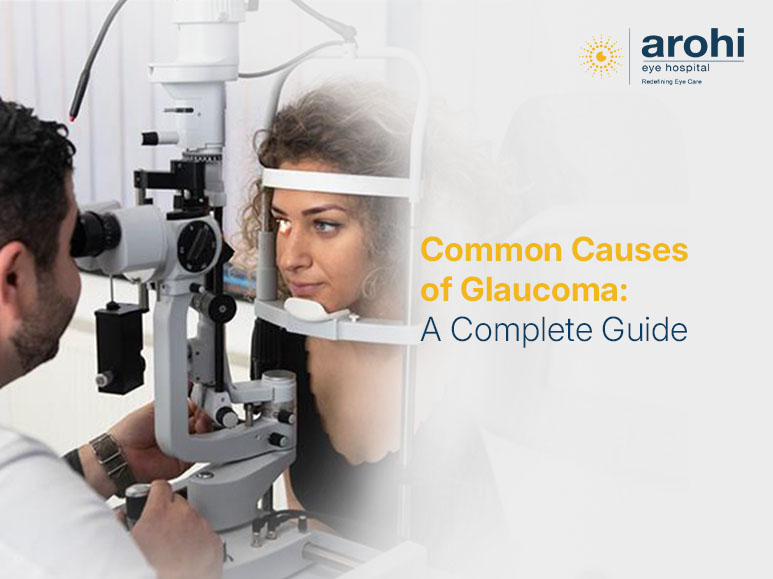Did you know that there are more than 12 million individuals in India living with glaucoma, and nearly 90% of them are undiagnosed? Glaucoma, often called the “silent thief of sight”, is a group of diseases that destroy the optic nerve over time and may cause blindness, often without early warning signs. So, what is glaucoma, and why should we know and care about its triggers? Understanding the common causes of glaucoma will allow individuals to understand that they are at risk, act promptly, and seek timely treatment to prevent it.
In this guide, you’ll understand the biological, genetic, medical, and lifestyle-related causes of glaucoma, the treatment options, and prevention methods. If you are at risk or want to protect your vision, this guide is your essential resource.
What Is Glaucoma?
Glaucoma is a group of eye conditions that gradually destroy the optic nerve that connects the eye with the brain. To understand glaucoma better, it’s essential to first understand how the human eye works. The eye has transparent fluid, which is known as aqueous humour. It is a water-like fluid that circulates and nurtures the eye structure. The fluid drains out through a mesh-like channel. In a case where this drainage is blocked or fails to work effectively, pressure builds up in the eye, referred to as intraocular pressure (IOP). Over time, this increased pressure may result in damage to the optic nerve, which is the structure for transmitting visual signals from the eye to the brain. A progressive destruction of this vital connection leads to glaucoma.
What Are The Causes of Glaucoma?
Glaucoma can be the result of a complex combination of both external and internal factors. Although elevated high pressure in the eye is its primary cause, other than that, genetics, age, medical conditions, medications, and lifestyle choices also contribute to it. It is essential to understand these common causes of glaucoma for early diagnosis and proper management.
1. Increased Intraocular Pressure (IOP)
The most direct and well-established cause among all glaucoma is high intraocular pressure. This pressure results from the eye’s inability to properly drain aqueous humour. Over time, the trapped fluid exerts pressure on the optic nerve, causing gradual loss of vision. While the normal IOP range is 10 to 21 mmHg, even borderline levels can be harmful for some people. Since optic nerve damage is typically irreversible, it is important to identify and control IOP early. This is why regular checks of the eye pressure are one of the cornerstones of glaucoma prevention.
2. Genetic Factors
Genetics plays a significant role in the development of glaucoma. When a close family member, e.g., a parent or a sibling, has glaucoma, you are at a high risk of developing glaucoma. Research links genes like MYOC, OPTN, and WDR36 to glaucoma. These genes often have mutations that cause the disease. Family history is key in primary open-angle glaucoma, which is the most common type. Therefore, the main cause of glaucoma in many cases can be traced back to inherited factors, which is why regular checkups are important if your family has a history of glaucoma.
3. Age-Related Changes
Age is another critical factor that influences the causes of glaucoma. As we age, structural changes in the eye, like narrowing of the drainage angle or decreasing resiliency of the optic nerve, make fluid drainage less efficient. Once a person reaches their 40s, the risk of glaucoma increases and doubles every passing decade. The causes of early glaucoma in older adults are often subtle, making annual eye examinations essential to spot the disease earlier. In middle age, lifestyle changes can ensure a delay in progression and decrease the risk factor.
4. Medical Conditions
Several systemic medical conditions are linked with glaucoma. For instance, diabetes can disrupt the blood circulation to the retina, which makes it more vulnerable. Hypertension may damage blood vessels in the eye, whereas thyroid diseases, and especially hyperthyroidism, may influence the fluid dynamics. Recent studies revealed a strong link between sleep apnoea and glaucoma, possibly due to reduced oxygen flow to the optic nerve when one is sleeping. These related conditions highlight the importance of holistic medical management in reducing glaucoma causes.
5. Medications That Increase Risk
There are some common medications that may inadvertently increase the risk of developing glaucoma. Long-term treatment with steroid-based drugs, either in the form of eye drops, inhalers, or orally, exceeds the intraocular pressure. Some blood pressure medications can reduce the blood flow to the optic nerve, while antidepressants and antihistamines narrow the angle of drainage in vulnerable people. Always inform your eye doctor of any medicine you are starting, especially when your family has a history or other risk factors.
6. Eye Injuries and Trauma
The internal structures, which regulate the fluid in the eye, could be destroyed due to blunt force trauma or other chemical injuries to the eye, hence causing secondary glaucoma. Even surgical procedures, such as cataract surgery or corneal procedures, can increase the risk if any complication occurs during the procedure. Such injuries may cause scarring, altered drainage, or inflammation which promote high eye pressure. Individuals who have experienced eye trauma in the past should undergo more frequent eye check-ups to detect early glaucoma.
7. Other Eye Conditions
Glaucoma is possible if there is an existing eye problem, such as:
- Myopia (nearsightedness) change the shape of the eye and increases susceptibility
- Untreated retinal detachment causes damage to the optic nerve
- Ocular tumors can physically obstruct Fluid flow
Visit an eye specialist in Mumbai for regular follow-ups in case you have these conditions or had a history of glaucoma in your close family.
Lifestyle and Environmental Factors That May Lead to Glaucoma
Everyday habits may put you at risk of developing glaucoma:
- An antioxidant-rich diet (Leafy greens, omega-3s) work well for optic nerve
- Regular exercise may minimise IOP slightly
- Smoking also aggravates the oxidative stress, which enhances nerve damage
- Caffeine in large amounts can spike IOP dramatically
- Excessive screen time and UV may not directly cause to glaucoma but can contribute to eye strain and overall eye health decline
Minor changes in your everyday life routine can help you in prevention.
Prevention Strategies For Glaucoma
Though there is no definitive glaucoma cure, many steps can prevent or delay its progression:
- Regular eye exams, especially after 40
- Control of systemic diseases like diabetes and hypertension
- Use of protective eyewear during sports or risky jobs
- Nutrient-rich diet and consistent exercise
- Avoid overuse of steroid medications
These strategies, when followed early, can significantly reduce the risk of severe damage.
Current Treatment Options and Management
The most frequent question which patients ask is “how to cure glaucoma?” however, the truth is glaucoma is manageable, not curable. Here’s how you can manage it:
- Eye drops: First-line treatment to reduce IOP
- Laser therapy: Aid in enhancing fluid drainage
- Surgical intervention: For advanced and unresponsive cases
While there is no glaucoma cure, it is very effectively manageable, especially when early intervention is acquired. And it is possible only if you take regular check-ups with a qualified eye specialist. You can visit our eye hospital to get timely glaucoma treatment in Mumbai and preserve your vision.
Conclusion
In this blog, we have discussed how glaucoma is caused by different interrelated factors such as eye pressure, genetics, and medical conditions. Being aware of glaucoma facts is the most important factor to save your vision. Read the complete blog to understand better and not rely on a single perspective. Explore every angle, from medical insights to patient experiences. And do not miss our real-life testimonials to see how timely diagnosis and treatment may transform lives. Don’t wait for symptoms; take proactive care today to preserve your vision for tomorrow, contact us today.
Frequently Asked Questions
1. Can glaucoma be corrected?
No, glaucoma cannot be corrected permanently but can be effectively managed to prevent further vision loss.
2. What is early-stage glaucoma?
It is the phase when the damage to the optic nerve begins but there is minimal or no loss of vision.
3. Can you stop glaucoma?
Progression can be slowed or halted with early diagnosis and consistent treatment.
4. What is the cost of glaucoma surgery in India?
Glaucoma surgery cost in India varies based on procedure and facility. Contact us for more information.
5. Can glaucoma be cured with eye drops?
Eye drops help control pressure but do not provide a permanent cure.
Dr. Shradha Goel (CEO)
Dr. Shradha Goel, Chief Surgeon at Arohi Eye Hospital, is a renowned Phaco-LASIK surgeon with over 10,000 surgeries to her credit. She earned her MBBS from Grant Medical College, Mumbai, and a Master’s in Ophthalmology from Kasturba Medical College, Manipal. As a member of the American Academy of Ophthalmology, Dr. Goel specialises in LASIK, refractive errors, and cataract treatments.



